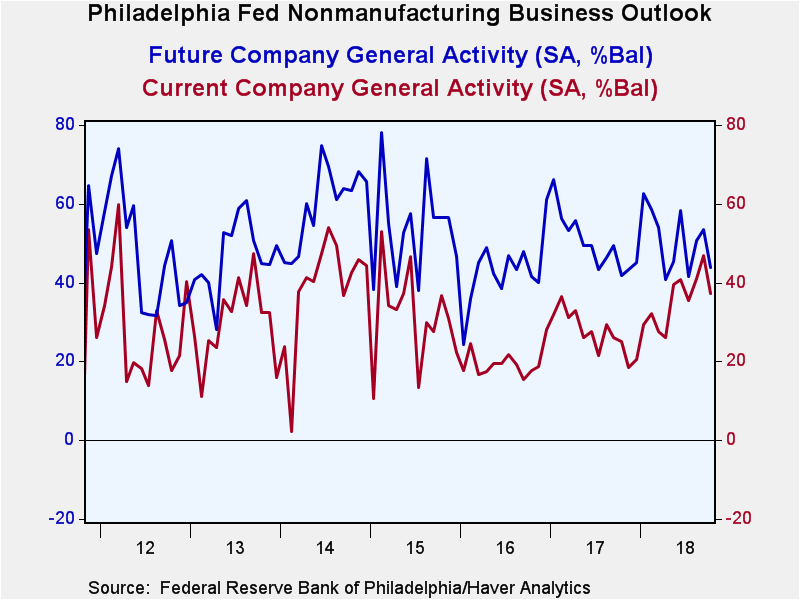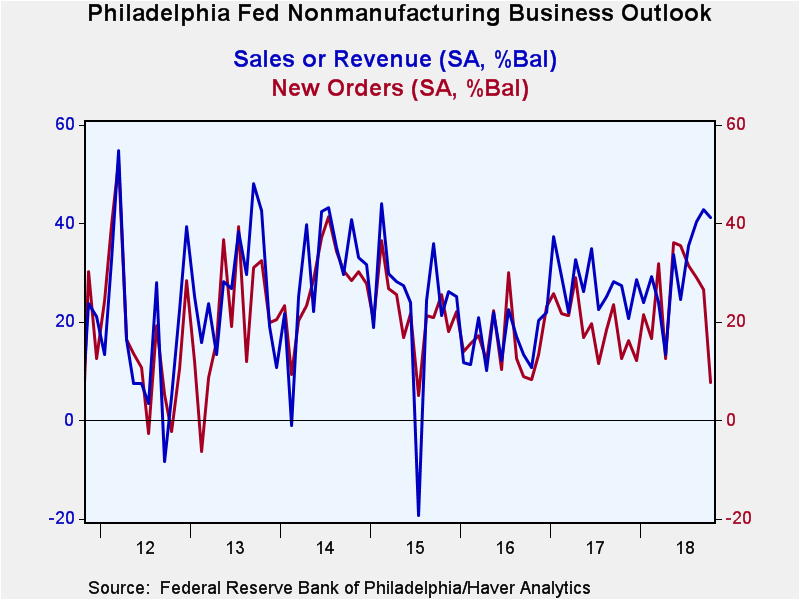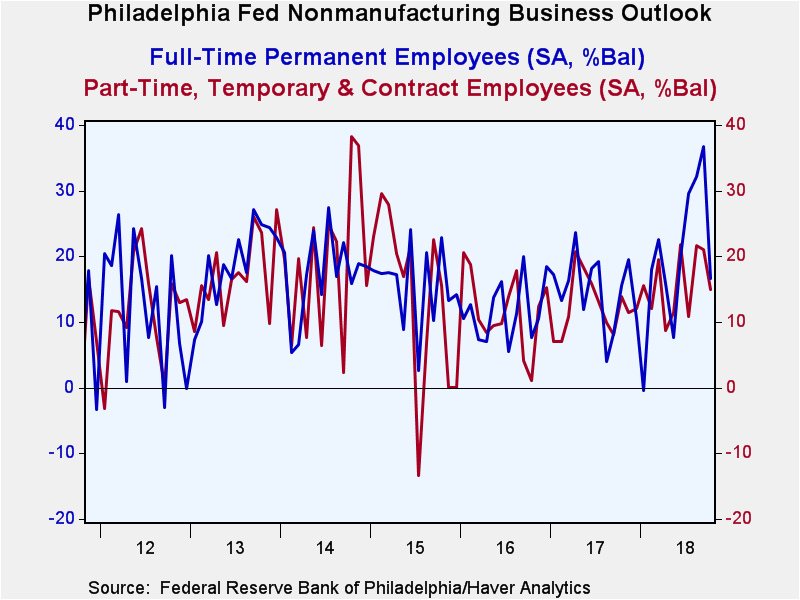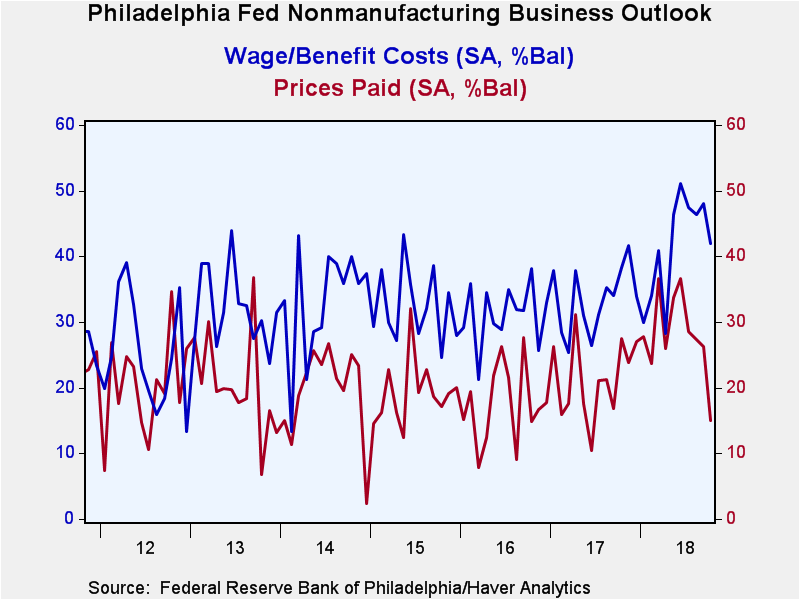 Global| Oct 23 2018
Global| Oct 23 2018Philadelphia Fed Nonmanufacturing Business Activity Weakens
by:Tom Moeller
|in:Economy in Brief
Summary
The Federal Reserve Bank of Philadelphia reported that its Nonmanufacturing Business Index of current conditions at the company level declined to 37.2 during October and reversed its September improvement. Despite the fall in the [...]
The Federal Reserve Bank of Philadelphia reported that its Nonmanufacturing Business Index of current conditions at the company level declined to 37.2 during October and reversed its September improvement. Despite the fall in the overall index, a higher 53 percent of respondents reported an improvement in current activity while a greatly increased 16% reported a decline.
The expectations index for October declined to 43.9 and was at the bottom of the range in place since early last year. Fifty-nine percent of respondents reported improved expectations while 15 percent indicated a decline.
The components of the overall index all deteriorated. The new orders series plummeted to the lowest level in over three years and the unfilled orders series also fell markedly. The inventory index similarly more-than-reversed its recent strength. Moving down just slightly was the sales or revenue index, but it remained improved sharply versus twelve months earlier.
On the labor front, the number of full-time permanent employees index deteriorated sharply after reaching a record high in September. A greatly lessened twenty-six percent of companies added jobs while a moderately higher nine percent indicated reduction. The index of part-time/temporary employment fell moderately m/m, but remained in the upward trend in place during the last year. The average workweek reading continued to trend sideways as it was little changed m/m. The index of wage & benefit costs weakened sharply to the lowest level in six months.
The index of prices paid plummeted to the lowest level since June of last year. A greatly lessened 18% of respondents paid higher prices while a slightly higher three percent paid less. The prices received index also weakened m/m, but remained in its recent upward trend.
The index for capital spending on equipment & software stabilized after deteriorating sharply during the prior two months. The capital expenditures for facilities index weakened greatly to the lowest level in two years.
The Philadelphia Fed figures are diffusion indexes which are calculated by subtracting the percent of respondents reporting poorer business conditions from those reporting improvement. So, readings above zero indicate more positive than negative responses. These indexes have a good correlation with growth in the series covered. The data are available in Haver's SURVEYS database.
| Federal Reserve Bank of Philadelphia: Nonmanufacturing Business Outlook Survey (Diffusion Index, SA) | Oct | Sep | Aug | Oct'17 | 2017 | 2016 | 2015 |
|---|---|---|---|---|---|---|---|
| General Activity - Company | 37.2 | 46.8 | 41.1 | 25.0 | 27.3 | 19.7 | 31.3 |
| New Orders | 7.8 | 26.7 | 29.0 | 23.6 | 12.5 | 15.7 | 21.8 |
| Sales or Revenue | 41.3 | 42.8 | 40.5 | 27.4 | 27.9 | 16.2 | 23.8 |
| Inventories | -1.5 | 13.9 | 9.5 | 1.3 | 3.8 | 4.4 | 5.2 |
| Number of Full-Time Permanent Employees | 16.6 | 36.7 | 32.2 | 15.6 | 14.8 | 11.7 | 15.6 |
| Prices Paid | 15.0 | 26.3 | 27.4 | 17.5 | 21.4 | 17.5 | 19.3 |
| Wage & Benefit Costs | 41.9 | 48.1 | 46.4 | 38.3 | 33.4 | 31.2 | 32.5 |
| Expected General Activity - Company | 43.9 | 53.6 | 50.7 | 41.7 | 49.9 | 43.0 | 53.8 |
Tom Moeller
AuthorMore in Author Profile »Prior to joining Haver Analytics in 2000, Mr. Moeller worked as the Economist at Chancellor Capital Management from 1985 to 1999. There, he developed comprehensive economic forecasts and interpreted economic data for equity and fixed income portfolio managers. Also at Chancellor, Mr. Moeller worked as an equity analyst and was responsible for researching and rating companies in the economically sensitive automobile and housing industries for investment in Chancellor’s equity portfolio. Prior to joining Chancellor, Mr. Moeller was an Economist at Citibank from 1979 to 1984. He also analyzed pricing behavior in the metals industry for the Council on Wage and Price Stability in Washington, D.C. In 1999, Mr. Moeller received the award for most accurate forecast from the Forecasters' Club of New York. From 1990 to 1992 he was President of the New York Association for Business Economists. Mr. Moeller earned an M.B.A. in Finance from Fordham University, where he graduated in 1987. He holds a Bachelor of Arts in Economics from George Washington University.










